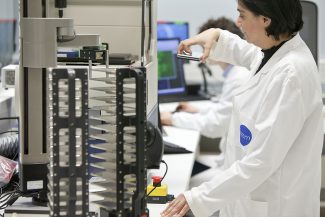In I-Stem, a team led by Alexandra Benchoua and Marc Pechanski enabled to prove the benefit of neuronal and celullar models derived from pluripotent stem cells for genetic autistic disorders.
These researches were focused on the Phelan-McDernid, a rare autistic disease of genetic origins which leads to a loss of one of the copies of the SHANK3 gene, and therefore to a decrease of the amount of SHANK3 protein.

After having developed a model allowing to produce in vitro human neurons from pluripotent stem cells, a high-throughput screening was carried out for 202 pharmacological compounds in order to determine which one would be more likely to rebalance the amount of protein.
At the end of this screening, lithium appeared to be the most efficient. A pharmacotherapy could then be performed for a year on a patient, giving very encouraging results because the degree of severity of the patient’s autism has decreased.
A randomised doubleblind trial is now being considered by researchers to confirm those results.
Alexandra Benchoua is in charge of the Neuroplasticity and Therapeutic team at I-Stem. Her team develops innovative technologies from patient’s stem cells. These models allow to carry out screenings of compounds from chemical libraries (collection of already known molecules used by the pharmaceutical industry) to identify those that have a therapeutic effect on the studied mechanism.
“We were lucky to work with geneticists and clinicians like Thomas Bourgeron and Richard Delorme. They were the ones who identified the needs and came to us. We tried to bring clinicians the needs they had to improve patients’ care” she explained.

